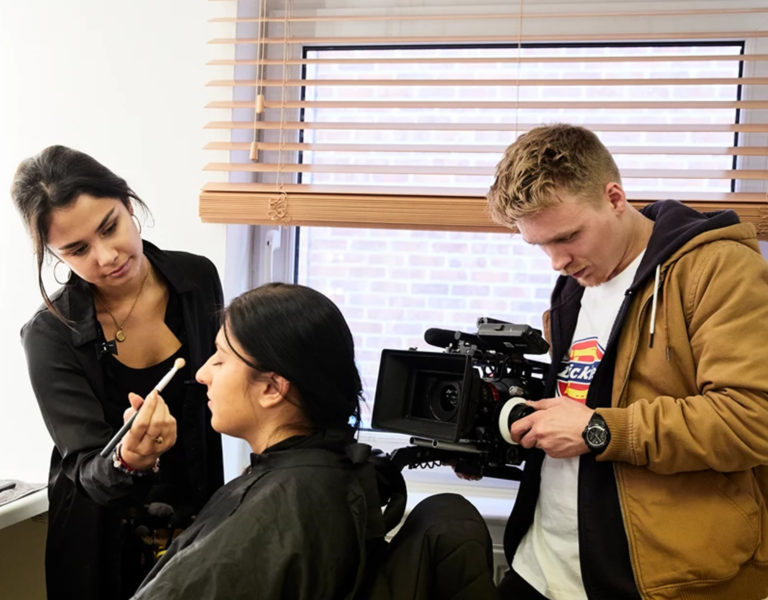
Following the recommendations set out by the Screen Sectors Skills Task Force in 2023, ScreenSkills has published its long-term vision that will power the future of the UK screen industries and make a significant contribution to the UK Creative Economy.
Rooted in partnerships and underpinned for the first time by pan-sector data analytics, this new strategy will ensure the creation of a world-leading, inclusive and agile workforce for the UK’s screen industries, estimated to be worth £13.48bn (Source: Screen Business, BFI, December 2021).
“This strategy is built on partnership and collaboration, bringing together industry, wider stakeholders, and government to build a workforce skilled for today and agile, adaptable, and resilient for tomorrow’s challenges. We are committed to creating a more diverse and inclusive workforce where opportunities are accessible to everyone,” commented Laura Mansfield, CEO, ScreenSkills. “By uniting efforts across sectors and regions, this strategy will address skills gaps, drive innovation, and empower the next generation of creative professionals, ensuring long-term sustainability and growth.”
ScreenSkills will play a crucial role in developing a trained and diverse workforce that will help the sector remain competitive globally as it transforms it’s governance and takes on the role of the sector’s strategic skills body.
“The transformation of Screen Skills into a more cohesive, data led long-term strategic partner to the industry is vital to powering the future of the UK’s creative economies, and the Screen Sectors Skills Task Force supports this new strategy,” said Georgia Brown. Chair, Skills Task Force. “Our industry thrives on innovation and talent, but to remain competitive on the global stage, we must provide a clearer roadmap for skills development and invest in sustainable and structured pathways for our workforce. With a more collaborative, connected and future facing approach we can ensure that our creative sectors not only meet current demands but continue to drive economic growth, cultural impact, workforce satisfaction and sustainability for generations to come.”
The five-year strategy will:
- Identify and Communicate Skills Needs: As the central resource for data on current and future skills gaps and shortages across the UK screen industries, ScreenSkills will help to shape strategic workforce planning. This includes forecasting future skills needs and communicating these insights to industry and Government, ensuring that training aligns with evolving demands.
- Ensure Access to High-Quality Training: Working with training providers and the education sector, ScreenSkills will ensure that training programmes are high-quality and inclusive. Initiatives such as expanding the ScreenSkills Training Passport, which standardises training records, will help streamline career progression, while commissioning targeted courses will address specific skills gaps.
- Build Strategic Partnerships: Strategic collaboration with industry bodies, screen agencies, training providers, and government will ensure that training is relevant and resources are used efficiently and that training is relevant. Key collaborations, such as with BBC, seven BFI Skills Clusters across the UK, and Create Central, will help address regional skills gaps and support local production ecosystems.
- Promote Equity, Diversity, and Inclusion (EDI): ScreenSkills is committed to improving access and progression for underrepresented groups across the UK. Partnerships with organisations like the Creative Diversity Network and the Sutton Trust will address socio-economic diversity, while initiatives like Trainee Finder will create pathways into the industry for diverse talent, supporting a more inclusive workforce. It will also partner with WorkWise for Screen and Action for Freelancers initiative to seek to improve the working culture for the screen sector’s workforce
- Future-Proof the Workforce: ScreenSkills will support skills development in emerging technologies. In partnership with UK Interactive Entertainment (Ukie), it will focus on building a sustainable talent base for the UK games industry, emphasising the crossover of skills between gaming, digital media, and TV. Additionally, collaboration with UK Screen Alliance will focus on skills development, researching skills gaps, and ensuring transferable skills in VFX and post-production.
Harriet Finney, BFI’s Deputy CEO and Executive Director of Corporate & Industry Affairs, said: “An industry-led approach to skills development was a core recommendation of the 2022 BFI Skills Review, and resulted in the BFI bringing together the Screen Sector Skills Taskforce. Today’s announcement sees ScreenSkills refocus their role, build a new strategy based on the Task Force report, and set out a commitment to work closely with industry and partners across the UK. Their commitment to developing a data-driven approach to address skills shortages and improve access to high quality training has huge potential to deliver a highly skilled and sustainable workforce, which is truly representative and accessible to all. We look forward to working closely with Lisa and Laura to support them in delivering on their strategy”
In the West Midlands, ScreenSkills is partnering with the BBC and Create Central to support the Skills Accelerator cluster programme. Now entering its second year, the programme is focused on mapping regional skills gaps to guide future training.
Ed Shedd, Chair, Create Central said: “At Create Central, we’re committed to growing the West Midlands creative content sector – and that requires a local, skilled workforce. This partnership with ScreenSkills and the BBC is an exciting step forward in our mission to bridge the skills gap in our region’s creative sector. By focusing on granular, data-driven insights into local industry needs, we’re not only supporting current training initiatives but also laying the groundwork for sustainable growth and production-ready skills that will serve the industry well into the future. Together, we’re empowering the next generation of creatives in the West Midlands.”
Dawn Beresford, Director of Talent and Skills, BBC Commissioning added: “The BBC is delighted to be working with ScreenSkills to develop new, impactful regional collaborations which support and underpin BBC and public sector investment in key, strategic locations for the sector and are excited to see where these conversations lead. The new strategy gives both ScreenSkills and the wider screen sector a shared blueprint to address the structural issues around access to the industry, career opportunities and reskilling, and to play a key role in growing the creative industries.”
In collaboration with Channel 4, ScreenSkills has commissioned Ampere Analysis to conduct a comprehensive study of the UK’s film and TV workforce. The findings will enable ScreenSkills to target its training efforts more effectively, ensuring that resources are directed where they are most needed.
Kevin Blacoe, Head of Partnerships and Skills, 4Skills, commented: “Establishing a clearer picture of the people who work in our industry – who they are, where they are and what they do – will enable 4Skills and ScreenSkills to continue to make much more meaningful and impactful interventions, to broadcasters, production companies and stakeholders will be able to make much more impactful and meaningful interventions to identify gaps, strengthen the workforce and bolster the creativity and resilience of British production.”
Additionally, the BBC and ScreenSkills will co-commission research to gain more detailed insight of the routes into the screen industries to support workforce planning. The research may consider analysing areas such as key entry points, including HE and FE courses, internships, and entry-level jobs, as well as barriers to entry and the wider impact of training routes.
As part of its ongoing transformation, ScreenSkills will streamline its Board to ensure it remains representative of the industry and the UK. Regular engagement with industry stakeholders will also help ensure that ScreenSkills stays responsive to the sector’s evolving needs.
“Our strategy, built on extensive consultation with industry professionals and stakeholders, reinforces our commitment to developing a future-ready workforce for the UK screen industries. Changes in our governance will streamline decision-making and enable us to respond to both immediate needs and long-term opportunities for growth,” said Lisa Opie, Chair, ScreenSkills. “By staying adaptable to emerging technologies and the shifting industry landscape, we will nurture and support a workforce that is diverse, highly skilled, and positioned to maintain the UK’s leadership in global content creation.”











